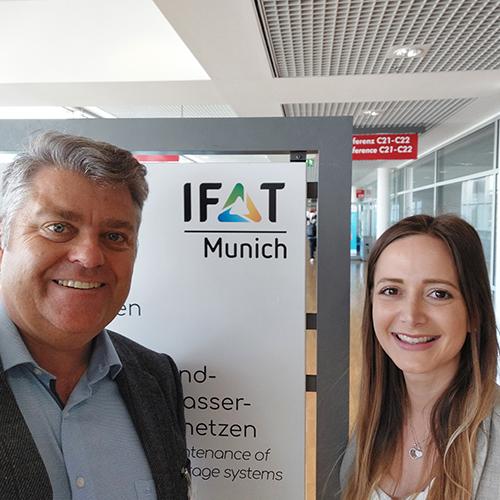
A topic of discussion at IFAT 2022
One of the main topics at IFAT 2022, the World Trade Fair for Water, Sewage, Refuse and Raw Materials Management, was certainly the circular economy. An increase in circular economy activities will make a significant contribution to climate protection. Conventional recycling processes are reaching their limits, which can only be overcome through further development and technologies. One example of such a new technology is chemical recycling. This process was discussed on site amongst a panel of participants from the waste sector and packaging industry, as well as from the technology sector. Here we briefly summarise for you the role of chemical recycling in achieving the climate targets and list processes that can be used for this purpose.
Climate-neutral economy by 2050 through circular economy?
According to the European Commission, a climate-neutral economy is to be achieved by 2050. The circular economy plays an important role in achieving this climate goal. In addition to the already known mechanical recycling, the chemical recycling process offers new possibilities for returning material flows to the cycle. In particular when it comes to plastic recycling, the chemical process is essential, as plastic polymers can be converted into their basic chemical components. To achieve this conversion, chemical processes such as pyrolysis, gasification and liquefaction are used (Environment Agency Austria, 2020).
These are applied depending on the complexity of the plastics. As a first step, simple, recyclable plastics, which cannot be recycled mechanically, are converted into a pyrolysis oil through pyrolysis. The pyrolysis oil can finally return to the material cycle. For more complex waste, gasification is used, in which the material is partially oxidised. In order to achieve climate neutrality, the CO2 generated in the process must be recaptured and returned to the circulation. The hydrogen required for this should come from renewable energy sources. The consequence of this is a high energy requirement, which at the same time shows the limits of chemical recycling.
Investing in recyclable design and chemical recycling
Another life cycle assessment (LCA) target is to eliminate completely fossil-based raw materials in plastic products by 2045-2050. The concept of a circular economy could be used to fulfil this goal. As was often mentioned, all strategies to achieve this climate target are welcome. One example of a strategy to reach this goal is recyclable product design. If recyclability is already taken into consideration during the design phase of plastics, long-lasting reusable products could be created that can be cleaned and reused.
One goal of the industry association for plastic packaging is to achieve 1 million tons of recyclate in plastic packaging, as well as a recyclability of 90%. However, only 40% of plastics can be mechanically recycled. In order to increase the recycling rate and subsequently achieve the climate targets, chemical recycling must be used accordingly. Nevertheless, there is still a need for action here. Both on the part of the packaging and plastics industries as well as in legislation so that the foundations for this are created. In order to achieve proper implementation of chemical recycling on a large scale, facilities must be planned, financed and built.
Conclusion
One thing is clear, it is important to be open to new technologies and to consider what is best for the environment and the climate. All waste materials that can be recycled mechanically should continue to be recycled by this method. In addition, chemical recycling must be used in the future. However, the necessary implementation requires appropriate financial and legal support and incentives to use chemical recycling to achieve the targeted recycling rate. The issue of renewable energy is also an essential factor to enable a climate-neutral recycling economy.
Sources
IFAT (IFAT | Weltleitmesse für Umwelttechnologien)
Federal Ministry for Economic Cooperation and Development Entwicklung (factsheet-klimaschutz-kreislaufwirtschaft.pdf (bmz.de))
European Commission (Ziele für 2050 | EU-Kommission (europa.eu))
Fachverband Kunsstoffrecycling – bvse (bvse - 5. IK-Nachhaltigkeitsbericht erschienen – Kunststoffverpackungen werden immer nachhaltiger)
Keywords
More similar blogposts:
Found what you were looking for?
Start your intelligent search now




